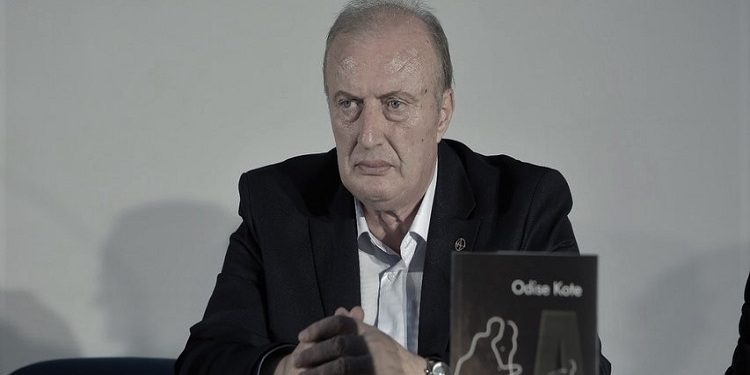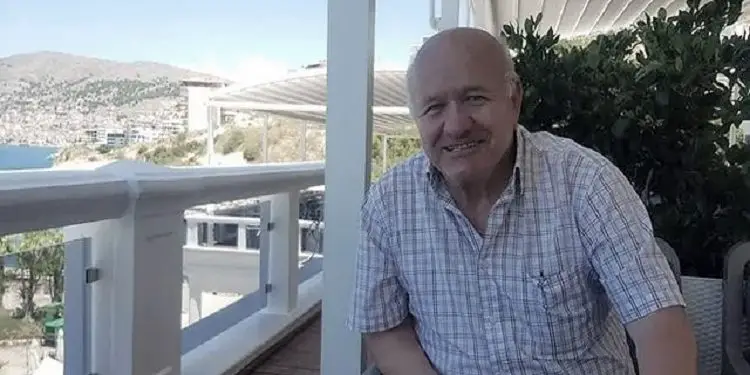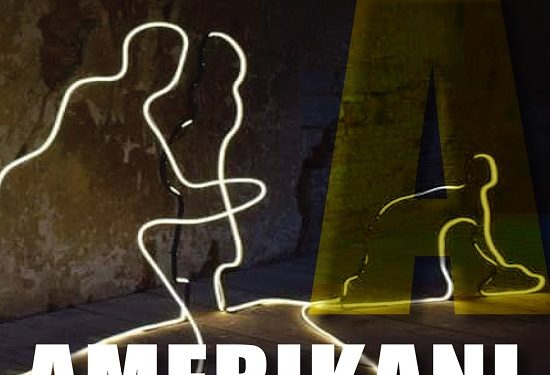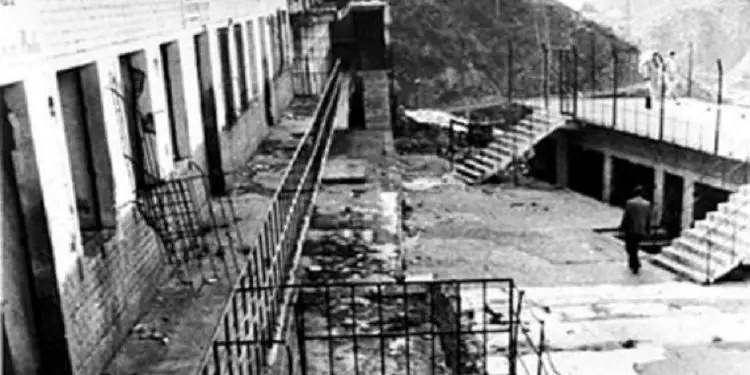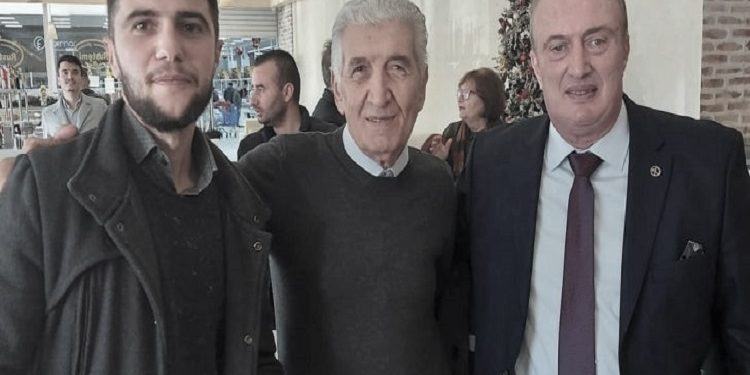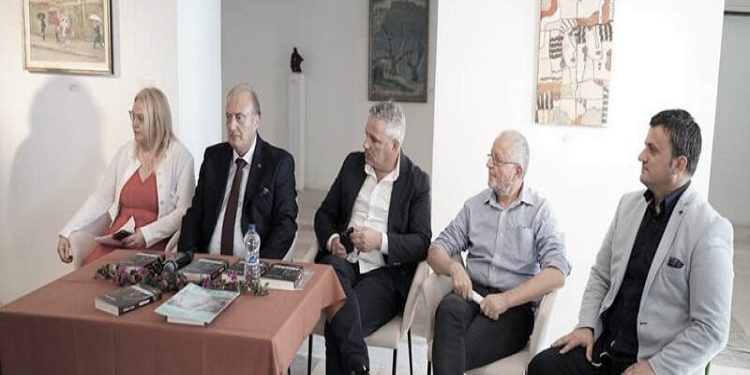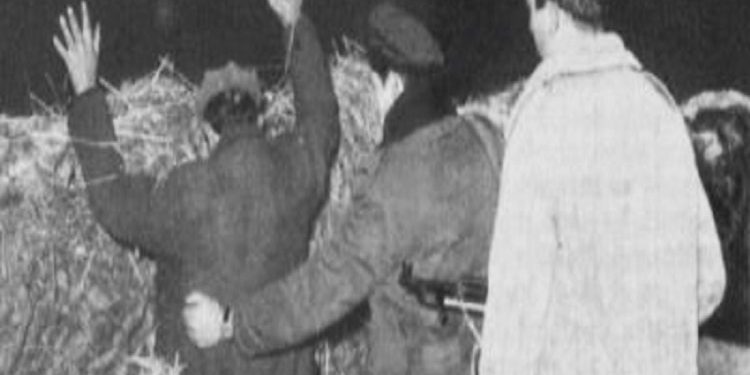By Timo Merkuri
The first part
Memorie.al / Through the “TOENA” Publishing House, Odise Kote brought the novel “Americani”, a work that shocks you like no other, in terms of content, as much as it amazes you for the art with which it was written. It is a very special novel, which comes for the first time in Albanian literature, with a subject like a soul pain, written in a poetic style with “grey color”, in which sorrow is like rain, the blackness of suffering, like the white dew of hope and like a misty tis, the pink of the heart. With this novel, Odise Kote proved his maturity as a dignified writer of contemporary Albanian literature.
I- In terms of content, “The American” is similar to Alexander Solzhenitsyn’s novel “The Gulag Archipelago”, but with a greater spatial extent of physical and spiritual suffering because: if Solzhenitsyn writes about the suffering and torture of the arrested and convicts in the interrogator, prisons and labor camps, Odise Kote, tells us with an artistic language that: the whole of Albania was simply a collective prison, created by the monist state. In a way, we were all prisoners, despite the fact that some lived within the barbed wire of the camp, while others, within the clone of state borders.
“Amerikani”, is a novel that brings a new view of the fate, suffering and resistance of political prisoners in prison and outside it, and it must be read, either for its special aesthetic and literary values, or even as an apology, to those thousands of innocent convicts, for whom we have not known the truth of the punishment and suffering in the prisons and camps of the dictatorship. Our ignorance gives the former political convicts some comfort, but it does not relieve us at all from the feeling of error, because we have also called them “enemies”, without knowing anything about their “hostility”.
The “leaders” of the tribunes were presented to us as “enemies”, and we did not think that very soon, they, our neighbors, friends and brothers would become such. The wave of arrests approached the Albanian families (mostly) intellectuals and artists, as the wave of the sea approaches the children in Ranishte, which they try to “save” by dancing or running away. The arrival of the sea wave and jumping or running away from it is a child’s game that creates bursts of laughter, while the arrival of the wave of arrests was a horror that began with pain and continued with suffering.
There is another aspect, the time of the arrival of this novel by Odise Kote, which raises its values. After the fall of communism in Albania, many creators who had lived the hell of prisons and exiles, began to write about their sufferings in the investigation, prisons and labor camps, and even advertised this creativity as the birth of “prison literature” or, “burgology”, thesis and creativity that temporarily attracted the attention of readers. I have to say that, with few exceptions (such as Visar Zhiti, etc.) this literary “current” “lost” the interest of readers, like a river that gets lost in the desert sand, and this, not because of the fault of the readers, but because of the mistake of the authors.
For the most part, this work was a kind of narrative, far from being literature. it was written “black on black”, without art and without literary finesse. At the time when the interest in literature is “growing”, the “growth” of “prison literature” indirectly “helped” and the cold style, the hatred of the propagandist type, with which they were written, forgetting that art in general and literary art in particular, it is love first. This means that even when writing about the opponent, no matter how much you hate them, their phrases and words, or about them, should be written with art and finesse, so that they speak much more than their grammatical meaning, because they, are part of the literary art and not a physical part, of the opposing man.
II- “Amerikani” by Odise Kotes, is a novel that enters Albanian literature with dignity and stands at its upper level, because in all the pages of the book, life in the dark monistic Albania is written and experienced artistically, but at the same time it is felt you can see the light, beyond this darkness. In the artistic discourse of the novel, various characters bear witness to the suffering, feelings and thoughts, while we feel the physical wounds of the convicts more in the reading, or in the psychological effect and the struggle for existence.
If we had to reflect the development of life in the “world” of the novel, this would be done with a group of words that remind us of the description in the Bible of the creation of life on earth in order: Chaos, Fog and Clarity. A real chaos of legality, actions, thoughts and feelings, flood the world of Nelson Andreas, from the moment he steps on the Albanian soil, a dense fog of disorientation, covers his life in the conditions of a life, according to the norms and socialist principles behind the prison, a fog that slips towards dissolution, to give way to a heavenly and spiritual clarity, or rather, a triumph of life.
The character Nelson Andrea, coming from the American paradise to the monist hell, in the most unexpected way for him, as an artist, finds himself in some relationships, which he never thought existed, and precisely he finds himself in:
a) – the artist’s relationship with the dictatorship, where he initially, mostly due to his ignorance of the functioning of life in monism, feels like he “fell off the ship in the middle of the sea” and is drowning, but clinging to his art, as after a rope, is reattached to the deck of life.
b) – the relationship of the artist with the society, when the Albanian society lived under a cyclone of rampant propaganda, without life, without vision and true art, it was seen as a “blasphemy”, as a challenge to the regime, as a foreign influence, while the artists were punished, persecuted, deprived of the right to exercise their art, and yet, they continued to create their art in silence, away from the public eye.
c) – the artist’s relationship with himself was an exhausting relationship for Nelson Andre. His soul as an artist was boiling like a lava, while the psychological pressure, the violence of the monist state and its structures, weighed on the mouth of his spiritual “crater”, like lead plates, on the mouth of radioactive clouds, through nuclear laboratories.
The character Nelson (Nelo) Andrea, in twenty-three years of imprisonment, persecution, surveillance, etc., fights to preserve his artistic and humane spirit and life in a society that “robbed” him of his identity, because he feels that, if prison or this life that he leads, as an outcast, crumbles his personality and talent under the daily violence, then he is devalued as a human being, and has no dignified future as an artist, therefore: “He washes, feeds, wears a vest and a white shirt with high collars and comes down to the dome. The dome was his church, that church like Father Arthur Liolini’s there in Boston. Kubeja and violin performance are the instruments that transform the Albanian Nelo Andrea, a municipal gravedigger, into the American Nelson Andrea.
This intellectual resistance is his struggle, survival is victory, his sacrifice, were the lost years, not only in prisons and labor camps, but all the years of his stay in Albania. “Nelson Andrea, for the first time in his life, felt pain, strong pain in his chest. More than pain, it was self-pity. He had wasted twenty-three years of his life in this country. Who had he forgiven and why”?
Imagine a young man, grown up living in the boulevards and concert halls of Boston, coming to Albania, from where he fled as a two-year-old child, and as soon as he set foot on Albanian soil, they put a sack on his head, handcuffs, even behind his back and is facing the blow of a state, with a medieval mentality and methods, of behavior and direction. In reality, Nelson Andrea was not an enemy of Albania nor of the monist government, even he knew nothing about the National Liberation War (what do I have to do with the war, he says to himself somewhere) nor about the monist state, or the class war.
He was an American citizen who came to his native Albania, but came at the wrong time and with the (wrong) American passport. It was this passport that positioned him as an “enemy” of his country, it was what irritated investigators, police and prison guards, and even his “tutor”, Rako Siran. That passport gave him the name “imperialist”, so the psychological pressure and violence were blows that came one after the other to his physique, personality, psychology and talent, with the force of surprise and then with the force of their intention.
Instinctively, to protect himself from them, he shut himself up in silence, as if in a “protective corps”, which took the most suitable form resistant to any kind of blow, without feeling that this “suitable form”, was in in fact, a refraction of his personality and psychology, like iron that, when heated, is refracted by its own weight. Despite the portrait of some “prison literature” characters, who appear “heroic” in dungeons, prisons or internment camps, and who mostly resemble the positive “heroes” of socio-realism, (except in the opposite direction), Odise Kote, in his character, objectively presents the alienating influence of the pressure of the dictatorship on him.
Nelson (Nelo) Andrea, did not put himself in the service of the police and the investigation, he did not even commit “soft treason” (the indifferent attitude towards the fate of his friends and comrades), but the long time, of twenty-three years under the pressure, not only psychological, but also economic and physical, caused him to be “affected” by the spirit of the time of “revenge” addressed to the persons responsible for his suffering. It is a well-known psychological phenomenon: a man with a prominent personality and high culture, when he is forced to live in an environment where violence is present in all the pores of society’s life and in all forms, after the violence, he instinctively, seeks to remove from himself, the humiliating feeling of this violation, by taking revenge on the violator:
“Andrea took a deep breath and addressed the American ambassador: Excellency! You have honored me a lot today…! But excuse me… there in the third row, there is someone who should not have been in this room, and should not have even heard this music! “Nelson Andreas’ eye had spotted Rako Siranin in the third row, among the guests.”
He thought as a persecuted Albanian (and not as an American convicted in Albania), that it was in principle right to request the absence of Rako Sirani, the cause of his suffering, in that lounge of the American embassy, where he, as a guest special, together with his daughter he gave a violin recital, so surely he was surprised by the answer of the American ambassador: “No problem, no problem, – the ambassador skillfully reacted….! Out of courtesy, he rose from his seat, greeted the two violinists, father and daughter, and asked: No problem, this is democracy. We continue with the program further”.
He would need for some time, a new climate, a new way of life, to regenerate this “oppression of his koraca”, or even to throw the koraca itself into oblivion. The reflection of this influence is proof of the author’s detailed knowledge of human psychology, and this makes his character very real.
III-There is another view, which makes this novel an artistic work: it makes the object of artistic treatment, many historical events of the time, traditions and customs typical of the stone city, secrets that everyone knew, but that no one mentioned, portraits of people “engraved”, like in stone, etc. All these phenomena, events and persons, in fact, are not given with the intention of being highlighted in particular, but serve as an “environment”, where the “history”, treated in the novel, lives. Their reflection, on an artistic level, does not raise them to a pedestal, but brings them closer as a “bas-relief”, to the foundation of the artistic monument of the work.
With his art, as with a violin bow, Odise Kote has touched the thinnest and invisible threads of life, giving us a painful music, up to this point, in this novel written with an artistic intensity, to creates the impression that events rush to end quickly, hastily, like a period of pain, without excessive clarifications and details:
“As soon as the soles of the feet touched the Albanian land, dreamed of for a long time, it was stopped. Without the slightest explanation, two powerful men took him by the arms, knocked him to the ground and handcuffed his wrists…! Then they lifted him up like a feather, after throwing the sack of xana over his head, they put him in “Gaz” 69, of the Internal Affairs Branch”, while he presents us inside “Gaz” 69, of the Police, the persons who performed this action: “Besides the driver, there were two other men, armed…! From time to time, a long conversation and a dry cough of one of them could be heard…! The other was a hokatar. He kept telling stories of the village, with fox traps, wells and men falling from the fig tree, ivy, bride abductions and ribs…! Both smoked cigarettes. It smelled bad…”!
These two lines of the portrait are enough to recognize the cultural level of the policemen, but also to anticipate the “professional” development of the investigation: “When he sobered up a bit, he saw that a hawk-eyed Gjatovino was sitting in front of him. Holak, hazel rod, as if it had sprouted from the shadow…! Suddenly he remembered that he came from hell. Gjatovinua, hawk-eyed, asked him about his name, family and reason; why had he come from that America to Albania”. It would be enough to ask the question: “Why did he come to America…”, a wording of questions, which are usually asked by uneducated people from rural areas, to friends who host from the city: what do we have in that village? To be sure, and the investigation consisted of civil servants without citizenship seeking official positions. Further: … he brought (my chair) close to him and spoke in a smooth voice, … which resembled thin turbans that are inserted minutely into the ear.
“We all have a secret…! Back to the two of us. how do you say Your silence can cost us both our lives.…A month ago….! I was transferred here to this wasteland, to this swamp. Why? Maybe a new trial? Suddenly you appeared, a gift from heaven, or a curse?! You will either be my grave or my salvation. Let’s not waste each other’s time”! In these last three lines, we see the psychological portrait of a sadistic investigator, who, in order to rise to the task, after “coming to this loss”, seeks salvation in the crucifixion of the “victim”, in breaking, defeating, or disintegrating his. It is understood that these guys are the ones who raised ladders with corpses, to climb their careers or to save themselves.
“Dozens of enemies of the people entered this room. They came in like lions and came out like lambs. Do not seek their fortune. Don’t stop it. Feeling and forgiveness are a good journey. So here you will be empty. Will you tell me about who sent you and who you work for? the arrested person is threatened, testifying to civic vulgarity, professional shallowness and violence as the only means, not only of him, but of a generation of police officials, who slandered the entire people with animalistic rudeness.
If someone guesses about the “jatovina”, as a special case, let’s see the other investigator: “They had replaced (jatovina), with a short beard, a mustache and a big head. His eyes were red and his shirt was unbuttoned to show his broad hairy chest… and he whispered: Don’t be scared, baby. Routine question. Then we will have some work, we will make it. how do you say …The woodpecker cut the cashew in the wood? What did you use…! Twenty-seven more midnights, in a row, that lasted until dawn.”
Let’s see a scene from a working day of the prisoner Nelson Andrea: “He was not completely satisfied with air…, when suddenly, at the end of his thin neck, the long whip of Gërdhuqi rushed at him with lightning speed. As if he cut his vein. He had eavesdropped on her, he had approached her from behind and then he had stalked her like a beast, like a beast, when it stalks its prey. “Imperialist, enemy of the people, dog”, – were the drool-filled slurs of Captain Gërdhuqi. “Who do you beckon, who do you signal? That’s all you have to do. I can’t get out of my hands. I’ll rip your skin off” – the whippings and heavy shoes with spikes didn’t stop…! Captain Gërdhuqi, rested only when he was tired”.
And to think that Nelson Andrea, on the verge of violence, was not on the verge of an attempt to escape, on the contrary, he was in a musical haunting, after physical exhaustion from hard work, precisely at the moment when: “He began to whistle a melody that an invisible bird, easily emerged from the lung spaces. As if the sounds, they couldn’t wait to burst the chest cage and push the bird with invisible hands, push it up, up, so that it would get out of there and run away without returning, towards the heavens. It felt completely weightless. As if he would fly himself”! “Nelo Andrea, left the camp commander’s office, Meleq Hazenbeu, bloodier than when he entered. Blood burst from all his veins. He had finally understood that the steps to the camp commander’s office were not the ones that led to a state official, but the road that led straight to hell”, then he clearly sees two worlds, two cultures facing each other, two people who “speak in different eras”, although they are contemporaries.
The artist is stronger than the dictatorship, longer than it, therefore, the dictatorship first hits the artists and poets, imprisons them, exiles them, takes away their right to publish their art, because I know that art, through the passages of secret and silent, lights the fire of hope and on thoughts like: “wood wet with fear”. Dictatorship kills artists, but it has no power to kill their art, since this art lives on for many decades after the fall of the dictatorship, even at this very time, this art shines like a comet, which instead of the tail of fiery, there are memories of the life and resistance of the artists, against the dictatorship.
At the time when prison and camp captains dreamed and projected more “efficient” forms of violence against prisoners, they experienced broad visions of humanity. Thus, since that day, his investigation had ended, without any guilt, Nelson Andrea had experienced a spirit of Christian kindness and forgiveness: “God does not want some to cry more and some to cry less. Let the winner forgive. Forgiveness is never fear. And all possessed by a thin mist of kindness, on that warm sunny day, even Captain Gërdhuq, the soulless monster of the camp, looked at him somewhat with pity”, without thinking that with these feelings he was witnessing his “victory” and his strength, because the brave and strong always forgive, the weak kill.
During vacations at the investigator, he experienced his former success in the competition: “…for a violinist position in the great Boston symphony orchestra. …He won. For six months, he was one of the three young musicians of the Orchestra”. “He dreamed detailed journeys for his soul. In holy, blessed places. Because the universe is inside man. Man knows his destinations. But now, it seemed that inside him, it had become an eclipse, with so much terror, loneliness, bewilderment”, so he increased the belief in himself that: “One day, I will escape from this hell and I will confess to the world, the horrors and his cruelties”, which reminds us Father Zef Plumbi and his motto: “Rrno only for me callzue”.
IV – The Albanian life of the time did not allow anyone to breathe freely and realize his spiritual desires, it was a life commanded, planned, controlled from above. From above came the food stamps, from above came the study rights, which in most of them, had no access to the passions of the graduates, from above came the appointments to work, from above the tastes in clothing and haircuts, the movies you want were seen, the music to be heard, the pants to be worn and the style of haircut. Even love and marriages were under control, every love or marriage, with a girl or boy from a family “with a stain on the biography”, “tainted” the groom or the bride and their family. In general, it was a monotonous life, with marked deficiencies even in basic foods, a life that did not inspire you and in the event that someone would go outside the framework of society, he would immediately be put under control.
Intellectuals and artists were the first targets of the vigilance of the police. News about the arrests of poets and writers, oil engineers and doctors, cancellation of publishing rights or the exercise of the publishing profession and deportations of families, had become a daily routine. Fear swarmed the cities, more frequent and denser than the fog.
Nelson Andrea, this artist, member of one of the most popular symphony orchestras in the world, suddenly finds himself in front of the structures of a state that glorified the cult of violence. It was the state of the dictatorship of the proletariat that, the “wood” actually had the “mast of the state ship”, where all its “sails” were kept. Meanwhile, we remember that; the novel begins in 1967, a time when the development and progress of the country required the respect and appreciation of intellectuals to lead the sectors of life, because a society that values and honors artists and intellectuals is a society that works for the development and progress of her.
But in Albania, the fact that these young men and women were intellectuals made them unreliable for the state. It was in fact the time of a “de facto” antagonism between the intellectuals and the “quarter-educated” clerks, who had only learned to read and write, through accelerated courses against illiteracy. These “educated quarters” felt and understood that the progress and education of the country would displace them in the second and third line of administrative, state and artistic direction, so with arrogance, servility, espionage, provocation and especially by exercising psychological violence against artists and intellectuals, they weighed down “their” time, so that they don’t run away, like sandbags weigh down balloons, so that they don’t rise.
It is said that physical violence is the “strength” of the weak, which includes the disabled and the “quarterly educated”, since in these years, they are usually called “illiterate”, because they didn’t know anything other than to read the newspaper. As such, they had found support in violence, which they used sparingly when their official position allowed them. It is terrible, the violence that is exercised on intellectuals and artists, it is painful, destructive, because it is merciless. This violence, among other reasons, also holds within it the anger of the illiterate towards the intellectual, for the reason that: the very presence of the intellectual proves their “hidden” weakness, not in the drawers of the table behind which they sit, but in the drawers of conscience and memory theirs. Why the state gave leadership positions and executive powers to such people, instead of putting educated people in those places is one of the reasons why our country was left behind in all areas of life, while it was one of the factors that influenced the downfall with delay of communism in us. / Memorie.al
The next issue follows




